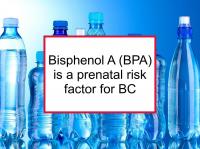A new study has reported that bisphenol A (BPA) promotes mammary tumor development in two mouse models of breast cancer. Bisphenol A is an industrial chemical that leaches from food containers during normal usage. Early and ongoing exposure to endocrine disruptors increases the potential for long-term adverse health effects.
In the study, the authors investigated the impact of fetal exposure to bisphenol A on subsequent mammary tumor susceptibility. They also examined bisphenol A's growth promoting effects on human breast cancer cell grafts in mice.
Pregnant mice were administered either 25 µg/kg, 250 µg/kg or no bisphenol A (control group). Female offspring were subsequently treated with a known mammary carcinogen. No significant differences in mammary development were observed among the three groups. However, both the low dose and high dose bisphenol A groups had a statistically significant increase in susceptibility to carcinogen-induced mammary tumors compared to the controls.
To determine if bisphenol A also promotes the growth of established tumors, hormone receptor positive MCF-7 human breast cancer cells were injected into flanks of ovariectomized female mice. The mice were treated with bisphenol A, estradiol, or a placebo, alone or in combination with tamoxifen. Both the estradiol and bisphenol A groups formed tumors by week seven after transplantation, whereas the placebo group showed no evidence of tumors. Tamoxifen was found to reverse the effects of both estradiol and bisphenol A. The authors conclude that bisphenol A may increase mammary tumorigenesis through at least two mechanisms: molecular alteration of fetal mammary glands and direct promotion of estrogen dependent tumor growth.
Plastics to avoid
Bisphenol A and other endocrine disruptor can leach into food when certain plastics are heated, microwaved, put under pressure or simply scuffed and worn. Plastics that may leach these substances include (1) polyvinyl chloride (PVC), which may be found in cling wrap, some plastic squeeze bottles, and cooking oil bottles; (2) polystyrene, which may be found in styrofoam food containers and disposable cups and bowls; and (3) polycarbonates, which may be found in plastic baby bottles, water bottles, and clear plastic sippy cups. Children and adults alike should avoid all but temporary, low temperature uses of these products.
Plastic containers may be marked with a number in a triangle-like icon. Plastics marked 1, 2, 4 or 5 use less toxic additives in their manufacture. Products that use polyvinyl chloride should be marked with 3, polystyrene with a 6, and polycarbonate with a 7 — these are the ones to avoid.
Microplastics (plastic fragments < 5 mm) should also be avoided even if the plastic source is not marked with a 3, 6 or 7 or a source of BPA or phthalates. It has been reported that microplastics may act as endocrine-disrupting chemicals, therefore as risk factors for estrogen-driven diseases, among them breast cancer. Plastic water bottles, chewing gum, tea bags, and plastic food containers commonly leach microplastics.
